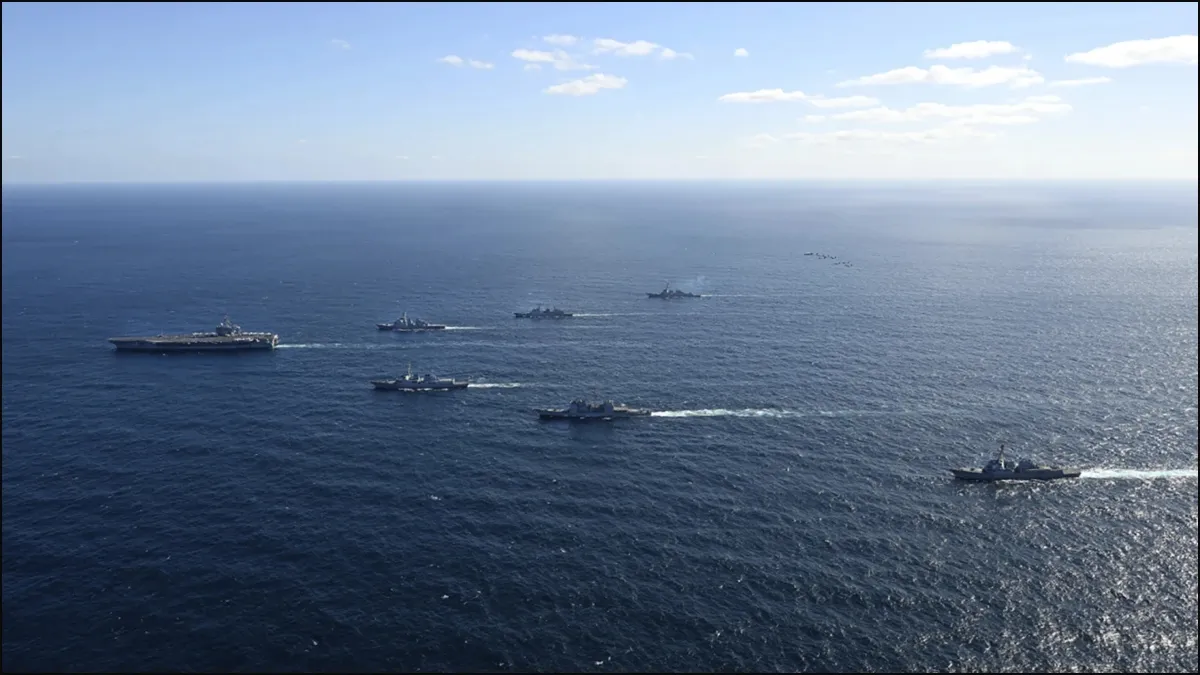North Korea tests underwater nuclear drone in response to US-led joint military drills
The drones are among a broad range of weapon systems demonstrated recently as tensions between North Korea and the US grow. The ministry's unnamed spokesman accused the United States, South Korea and Japan of "getting frantic" with military exercises and warned of "catastrophic consequences".

North Korea conducted a test of its underwater nuclear attack drone in response to joint military drills between the United States, South Korea and Japan this week, blaming its rivals for raising tensions in the region. The test of the "Haeil-5-23" system containing the nuclear drones was carried out by the defence ministry in the waters off its east coast, reported the state-run KCNA.
The alleged drone test came amid heightened tensions in the Korean Peninsula after North Korean leader Kim Jong-un declared he would scrap his country’s long-standing goal of a peaceful unification with South Korea and that his country would rewrite its constitution to define South Korea as its most hostile foreign adversary. Kim has also accelerated weapons demonstrations and threatened nuclear conflict with the US and South Korea.
The ministry's unnamed spokesman accused the United States, South Korea and Japan of "getting frantic" with military exercises and warned of "catastrophic consequences". The three countries' navies held their three-day regular drills until Wednesday, alongside the US aircraft carrier Carl Vinson, as part of efforts to improve their responses to Pyongyang's nuclear and missile threats.
North Korea's nuclear drone test
North Korea first tested the 'Haeil' (tsunami) system in March last year, which is designed to make sneak attacks in waters by creating a large radioactive wave through an underwater explosion. It is among a broad range of weapon systems demonstrated in recent years as Kim expands his arsenal of nuclear-capable weapons. South Korea’s military has insisted the North has exaggerated the capabilities of the drone.
“Our army’s underwater nuke-based countering posture is being further rounded off and its various maritime and underwater responsive actions will continue to deter the hostile military maneuvers of the navies of the US and its allies,” the North’s Defense Ministry said in a statement.
The latest reported underwater test came days after North Korea fired a new intermediate-range, solid-fuel hypersonic missile, which Washington, Seoul and Tokyo condemned as a serious violation of UN Security Council resolutions. The three allies' nuclear envoys gathered in Seoul on Thursday and condemned Pyongyang's arms trade with Russia, just as North Korea's foreign minister visited Moscow and met with President Vladimir Putin.
Intra-Korean tensions
Earlier, North Korea moved to abolish key government organisations managing relations with South Korea, as leader Kim Jong Un has made it clear that diplomacy and reunification with its rival is no longer possible in the wake of an expanded partnership between Seoul and Washington.
The North Korean Parliament said the two Koreas were locked in an "acute confrontation" and it is no longer tenable to hold the South as a partner in diplomacy. "The Committee for the Peaceful Reunification of the Country, the National Economic Cooperation Bureau and the (Mount Kumgang) International Tourism Administration, tools which existed for (North-South) dialogue, negotiations and cooperation, are abolished,” the assembly said.
Accusing Seoul of seeking regime collapse and unification by absorption, Kim warned his country did not intend to avoid war should it happen. North Korea should also plan for "completely occupying, subjugating and reclaiming" South Korea in the event of a war, and South Koreans should also no longer be referred to as fellow countrymen, Kim added.
The National Committee for the Peaceful Reunification has been North Korea’s main agency handling inter-Korean affairs since its establishment in 1961. The National Economic Cooperation Bureau and the Mount Kumgang International Tourism Administration had been set to handle joint economic and tourism projects between the Koreas during a brief period of reconciliation in the 2000s.
(with inputs from agencies)
ALSO READ | North Korea’s Foreign Minister holds meeting with Lavrov in Moscow amid concerns over alleged arms deal